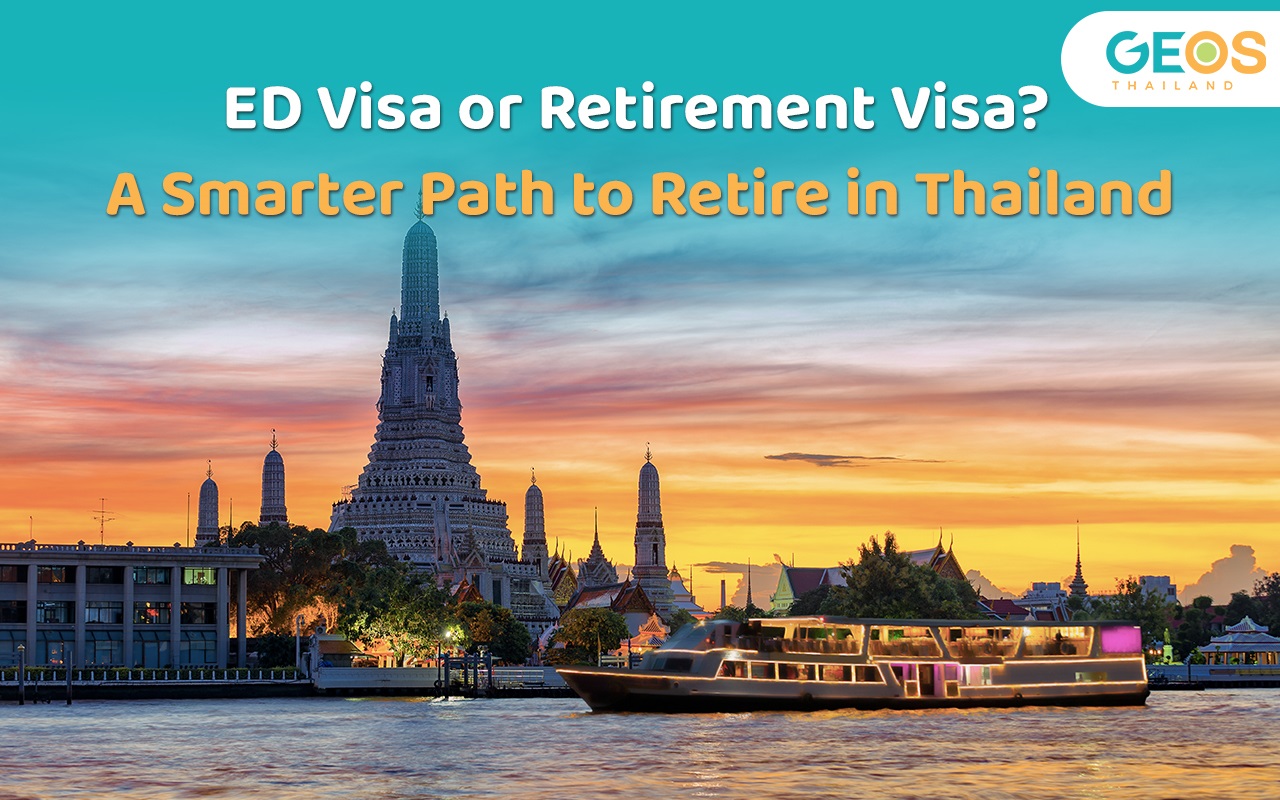
ED Visa or Retirement Visa? A Smarter Path to Retire in Thailand
If you’re looking to retire in Thailand, you might be surprised to learn that the best first step may not be the Thai retirement visa at all.
Instead, many savvy retirees in Thailand are discovering the benefits of starting with an education visa (ED visa). While the retirement visa in Thailand offers long-term security, it comes with strict financial requirements and a visa application process that can feel overwhelming, especially if you’re just settling in.
In this article, we’ll break down why the ED visa is often a smart first visa type for retirees. We’ll show you how to use it as a stepping stone toward a non-O retirement visa — with less stress, fewer upfront obligations, and more time to find your place in Thai life.

Understanding Thailand’s Non-Immigrant Visa Options
If you’re looking to retire in Thailand, you’ll likely explore one of these visa types:
1. Non-Immigrant ED Visa (Education Visa)
- Designed for full-time education, especially Thai language study
- Valid up to 14 months with an extension of stay
- Does not require income proof or health insurance
- Can be applied for outside of Thailand through a Thai embassy or consulate
For many retirees, the ED visa provides an easy, low-pressure way to enter Thailand and begin adjusting to the rhythm of local life
2. Non-Immigrant O Visa (Retirement Visa)
- Must be 50+ years old
- Requires 800,000 THB in a Thai bank or a monthly income of 65,000 THB
- Requires health insurance
- Usually starts with a 90-day non-immigrant visa, followed by an extension based on retirement
3. LTR Visa Thailand (Long-Term Resident Visa)
- Designed for high-net-worth individuals
- Requires large investments or very high income
- Less common among everyday retirees in Thailand
4. DTV Visa (Destination Thailand Visa)
- Introduced in 2024 as a new non-immigrant visa type
- Designed for digital nomads, remote workers, and soft power professionals
- Allows a long-term stay in Thailand (up to 5 years with renewals)
- Applicants must prove income, creative credentials, or employment outside of Thailand
Why this is not ideal for retirees:
While the DTV visa is valid for long-term stays, it is not recommended for retirees. Opening a Thai bank account under this visa is extremely difficult, and the visa application process is not tailored for non-working individuals.
Additionally, recent reports suggest the DTV is facing increased scrutiny at immigration, especially for those without ongoing remote work or clear financial backing.
Bottom line: For those looking to retire in Thailand without employment, the Non-O Retirement Visa or starting with an ED Visa is far more suitable.
Why Use the ED Visa First?
Here’s how starting with an education visa can make retirement in Thailand easier, especially for those who want to stay in Thailand long-term but aren’t quite ready to meet the full visa requirements of the retirement visa application.
1. Lower Barriers Than a Retirement Visa
The retirement visa has a lot of red tape:
- 800,000 THB in a Thai bank
- Health insurance
- Background checks
Application at a royal Thai embassy or Thai immigration office
By contrast, the ED visa is simple:
- Valid passport
- Letter from a licensed school
- Visa submitted outside Thailand through a designated Thai embassy or consulate-general
It’s ideal for retirees who are still getting their finances in order or want to try living in Thailand before committing to a full extension based on retirement.
2. Learn Thai While You Settle In
Thailand is a tonal language country. Many retirees arrive under a visa exemption scheme but quickly feel isolated. Using the ED visa first gives you time to:
- Learn Thai
- Understand Thai law
- Adjust to life in Thailand
- Prepare for your retirement visa application
3. Buy Time to Meet Financial and Insurance Requirements
The ED visa lets you:
- Transfer funds into Thailand gradually
- Open a bank account after six months of study
- Shop for Thai retirement visa-approved health insurance
- Avoid the pressure to leave the country if the documents are not yet ready
4. More Flexibility Than the Retirement Visa
The ED visa offers more breathing room. You’re not tied to a fixed extension of stay or required to re-enter Thailand under a new visa type every time something changes.
If you’re unsure about where to live, or just want to spend more time in Thailand without overcommitting, it’s a safe option.
ED Visa to Retirement Visa: How It Works
Here’s the actual transition path used by many retirees:
Step 1: Apply for the ED Visa
Apply at a Thai embassy or consulate in your country or within Thailand, depending on your nationality.
Step 2: Start Learning Thai
Attend weekly classes at a licensed school like GEOS Thailand. Use the time to settle into Thai culture.
Step 3: Meet the Financial Criteria
Once ready:
- Deposit funds
- Obtain insurance
- Prepare your retirement visa application
Important: Apply for the Retirement Visa Before You Travel
If you’re planning to retire in Thailand, here’s a key detail: the initial 90-day Non-Immigrant O visa that you apply for at a Thai embassy is your retirement visa. After that, you stay by applying for annual extensions — not new visas.
When you arrive in Thailand:
Submit your TM30 at immigration (your landlord or hotel can usually do this)
Obtain a residence certificate from your local immigration office
Use this to open a Thai bank account and transfer your funds
Immigration requires that the funds are in your Thai bank account for at least 60 days before applying for your first extension — and all of this should be completed within 30 days of arriving.
Step 4: Transition to the Retirement Visa
Before your ED visa ends, apply for a non-O visa at the immigration office in Thailand.
While not required, using a reputable visa agent can make the process smoother — especially if it is your first time switching visa types.
Frequently Asked Questions (FAQ)
Yes, but you will need to cancel your ED visa at immigration before switching. Once you are confident that you meet all the requirements for a retirement visa, visit your local immigration office to cancel your ED visa, then leave Thailand and return on a visa exemption stamp. After re-entering, you can start the retirement visa application process from within Thailand.
No. The standard education visa is a single-entry visa. That means if you leave Thailand during your stay, your visa will be void unless you apply for a re-entry permit before departure.
You can get this permit either:
- At your local immigration office (if you plan ahead), or
- At the airport, before you leave Thailand
For step-by-step instructions, see our full guide:
You must report every 90 days, just like with other non-immigrant visa types.
Not always. If you already meet all financial requirements and are confident about your retirement in Thailand, you can go straight for the non-O retirement route. But for many, starting with an education visa is a gentler way to transition.
Yes — especially the final syllable, “dee,” which should be said with a high tone. It means “good,” so saying it clearly and politely makes a good impression. Tone matters in Thai, and mastering even this small detail shows respect and helps you be understood.
Final Thoughts: Make Thailand Your Home, One Step at a Time
Retiring in Thailand is not just about beaches and cheap pad Thai. It’s about building a life here — learning the local language, navigating the rules, and adjusting to a new rhythm.
Starting with an ED visa allows you to:
- Avoid initial financial strain
- Learn Thai
- Get familiar with life in Thailand
- Transition smoothly to the Thai retirement visa
Whether you’re planning for a year or a lifetime, Thailand for a period feels more welcoming when you start slow, and visa first, rather than visa last.
Want to Start with the ED Visa?
At GEOS Language Centre in Bangkok, we’ve helped hundreds of retirees and students use the education visa to begin their journey in Thailand.



Contact GEOS Today and take your first step toward retirement in Thailand, stress-free.
Explore Our Magazine
Explore our collection of captivating articles, each offering a unique perspective



